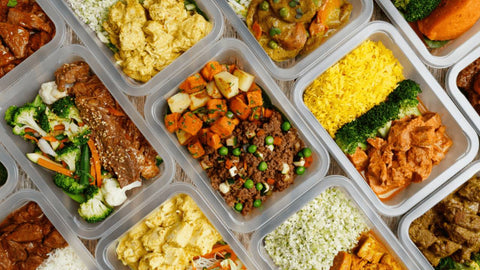Under eating is very easy to do unintentionally, both Marty & myself were doing this unknowingly for over a year. After a DexaScan with Riverside Side Body Scan and a consultation with Nicky, we have both corrected this and are feeling a huge improvement.
Under-eating is something that many people do intentionally when they are following a fad diet or new health trend. Others may be unintentionally under-eating if they have busy work schedules or simply aren’t aware of how much energy they are burning up compared to what’s going in their mouth. This is common in people who have high levels of exercise and physical activity. Under-eating whether its intentional or unintentional can have widespread impacts on your health and wellbeing and can be just as unhealthy as eating too much. The good news is that our bodies always have our best interests at heart and will usually give us plenty of warning signs that we are not eating enough. Read on for some of the signs and symptoms that you may not be getting enough energy in.
1/ You’re lacking energy and constantly feel tired
Every single cell in your body requires energy to function and food is our best source of energy in the form of calories! A calorie is a unit of energy your body uses in order to function. Every human being has something called a resting metabolic rate (RMR) which is essentially the MINIMUM amount of energy the body needs to carry out its basic functions over a day when at complete rest. This includes things like keeping your heart pumping and lungs functioning. In general, most people would have a RMR over 1000 calories. Your RMR does not include the energy you need to keep you active during the day yet many people consume close to 1000 calories a day or less! When caloric intake is too low this can have a negative impact on your energy levels causing you to feel fatigued and physically and mentally tired. A low caloric intake can also compromise your metabolism and slow it down.
The number of calories needed to maintain a healthy weight differs greatly from person to person and depends on a variety of factors including gender, muscle mass, age, activity levels and much more. Speak to an Accredited Practising Dietitian or qualified nutritionist if you are concerned you may not be meeting your energy requirements.
Always remember that the quality of your calories is just as important if not more important that the quantity of the calories you’re consuming!
2/ Your exercise performance is reduced
If you’re lacking energy in the gym and feel as though your fitness is not improving this may be a sign you’re under-fuelling yourself. Our main muscle fuel during moderate to high-intensity exercise is carbohydrates. If you’re not eating enough, especially carbohydrates, you may be feeling sluggish in the gym. Good sources of carbohydrates include sweet potato, brown rice, basmati rice, quinoa, rolled oats, sourdough or good quality seeded bread and fruit. Be sure to adjust your energy intake to match the amount of exercise that you are doing. Poor muscle gain or muscle loss can also be a sign of not fuelling the body enough. Aim for regular meals and snacks as well as consuming carbohydrates around your exercise or training sessions.
3/ You’re moody and irritable
Ever heard the term hangry? Its a mixture of being hungry and angry. Our brains like a steady supply of energy in the form of glucose (sugar). Not eating enough or skipping meals can cause our blood sugar levels to drop and consequently our patience may too. Signs of low blood sugar levels include hunger, anxiety, dizziness, sweating, confusion and changes in mood. If you’re feeling irritable, moody, light-headed and unable to focus these may be sign’s you’re not getting enough fuel in.
4/ You’re always hungry
Our bodies have in-built mechanisms to help protect us and keep us adequately nourished. Hunger is one way of our bodies ensuring that we are eating enough. When your stomach is empty it releases a hormone called ghrelin, also known as the hunger hormone. Ghrelin sends a message to the brain telling you to eat. Therefore being hungry all the time is a sign that you may not be eating enough food. A lack of sleep or poor sleep, chronic stress and certain hormonal conditions such as diabetes and insulin resistance may also cause rapid increases in hunger, so make sure to check in with your doctor if you have any concerns.
5/ Your digestion is compromised
Not going to the toilet regularly and having infrequent bowel habits may be related to not eating enough. It makes sense right? Our faeces are made up of waste matter that comes from from digesting food, so if you’re not eating enough food your bowel motions won’t have much bulk to them! Not eating enough usually means you have less opportunities throughout the day to consume adequate fibre and high fibre foods are necessary to keep us regular. When a person’s caloric intake level drops too low, this can also slow down your gut motility- that is how fast food moves through the digestive tract. It's your bodies way of making sure food moves through as slow as possible to suck out all the nutrition and calories from it. Chronic dieters and those suffering from disordered eating or eating disorders commonly report issues with digestion for this reason.
Other signs of under-eating may include;
- Poor mental concentration
- Dizziness
- Loss of period or normal menstrual function
- Difficulty falling pregnant
- Constantly thirsty
- Constantly feeling cold
- Hair loss
- Brittle nails
- Pale complexion
- Poor immune system
- Sleep disturbances
- Nutrient deficiencies
If you have any concerns about whether or not you may be eating enough or meeting your energy needs be sure to book in with an Accredited Practising Dietitian.
More information
Eatsense
Activate Foods
https://www.activatefoods.com.au/
Shop 2 / 222 The Entrance Rd, Erina NSW 2250

